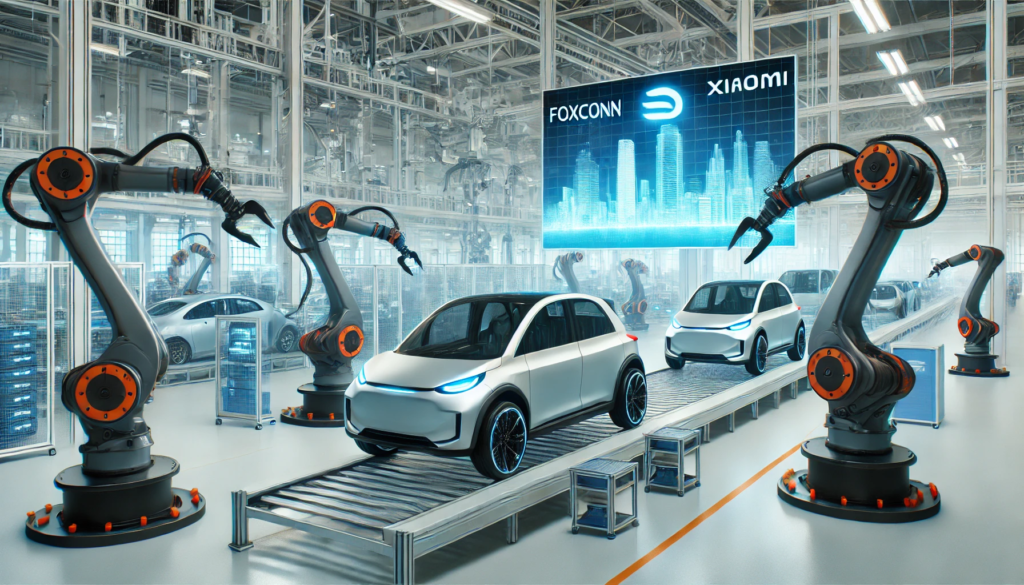
Foxconn, the Taiwanese electronics giant best known for manufacturing iPhones in its famed “iPhone City” in Zhengzhou, is shifting gears to enter the electric vehicle (EV) industry. This strategic pivot aims to reduce its dependency on Apple while expanding its revenue streams.
Zhengzhou, the capital of Henan province, has long been integral to Foxconn’s success. The region offers a robust supplier network, excellent infrastructure, and a vast labor force. At its peak, Foxconn employed about 250,000 workers to assemble iPhones. Now, the company plans to build a 700-acre EV manufacturing facility in the same region, marking a significant milestone in its diversification efforts.
Xiaomi’s Leap into Automobiles
On December 28, 2023, Xiaomi, another technology powerhouse, unveiled its first electric car, the Xiaomi SU7, at a technology event in Beijing. This C-class sports sedan is expected to hit mass production by mid-2024. Xiaomi’s CEO and founder, Lei Jun, expressed ambitions to challenge market leaders like Porsche and Tesla. The company aims to rank among the top five global car manufacturers within the next two decades.
Xiaomi’s move into the automotive sector represents a decade-long vision nearing its critical phase. The brand’s expertise in consumer technology is now converging with the automotive world, raising questions about how this will reshape traditional engineering and the driving experience. Xiaomi’s entry into this fiercely competitive market could redefine the global EV landscape and create significant investment opportunities.
Challenges in a Competitive Market
Despite Foxconn’s manufacturing expertise, the EV market presents substantial hurdles, including stiff competition and market uncertainty. For instance, tariffs imposed by the U.S. and European Union on Chinese-made EVs have increased costs, while a domestic price war among Chinese EV companies has driven margins down. Even Tesla, the global EV leader, has been forced to offer discounts to maintain market share.
Foxconn plans to adopt a contract manufacturing model for EVs, similar to its approach in electronics. However, analysts caution that success in the automotive industry depends not just on production efficiency but also on technological innovation, software integration, and, crucially, safety. Unlike smartphones, where malfunctions may result in inconvenience, defects in vehicles can have life-threatening consequences.
Technology Firms Turned Automakers
In China, the boundary between technology and automotive companies is increasingly blurred. Xiaomi, alongside tech giant Huawei, is leading this shift. Xiaomi recently began constructing its second EV factory, coinciding with Foxconn’s announcement of a new Zhengzhou facility. This convergence of technology and automotive industries signals a transformative period for the EV sector.
Leveraging Manufacturing Expertise
Foxconn believes its extensive experience in high-tech electronics will translate into success in the automotive industry. The company enjoys strong governmental support in Zhengzhou, including tax incentives, infrastructure investments, and emergency aid during challenges such as the COVID-19 pandemic. These advantages could position Foxconn as a formidable player in the global EV market.
Yet, industry experts remain cautious. Manufacturing expertise alone might not suffice in the EV sector, where innovation and consumer trust are critical. For Foxconn, the challenge lies in combining its manufacturing capabilities with cutting-edge software and ensuring the highest safety and reliability standards.
Expanding EV Ambitions
Foxconn’s EV aspirations are not limited to China. The company has invested hundreds of millions of dollars in EV manufacturing initiatives across Southeast Asia and Taiwan. A joint venture with Yulon Motor in Taiwan under the Foxtron brand has already produced 5,400 vehicles in 2024, including luxury cars and buses. However, this output pales in comparison to leading Chinese EV manufacturers, highlighting the need for Foxconn to scale up rapidly to remain competitive.
The Road Ahead
Foxconn’s entry into the EV market represents a bold strategy to diversify beyond electronics. While the company benefits from its vast manufacturing expertise and government backing, the EV industry demands a different set of skills—innovation, advanced technology, and a deep understanding of consumer expectations.
As Foxconn and Xiaomi venture into the EV space, their ability to adapt to this dynamic market will determine their success. With established automakers and tech firms competing fiercely, the journey from smartphones to smart cars promises to reshape not only their business models but also the future of transportation itself.